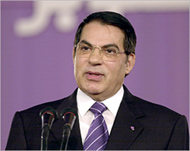Doubt cast on Tunisian poll plan
Tunisian presidential and legislative elections this month will mark another setback in efforts to create a true democracy in the North African country, an opposition party boycotting the ballots says.

Mustafa bin Jafar, leader of the socialist Democratic Forum for Freedom and Labour, said: “Tunisia will have false elections in so far as there is no genuine political pluralism in this country.”
The government says the 24 October presidential election, being contested by incumbent President Zain al-Abidin bin Ali and three opponents from tiny legal parties, proves Tunisia is moving towards democracy.
Tunisia‘s limited democratic credentials, according to diplomats, puts the West, and particularly the United States, in a difficult position as they seek greater democracy in the Arab world while lobbying for allies in the “war on terror”.
Having stood as the sole candidate in 1989 and 1994, and facing two rivals in the first open elections in 1999, bin Ali won more than 99% of the votes respectively – figures critics say mock pledges of free and fair ballots.
Bin Ali secured more than 99% approval in a 2002 referendum on a new constitution that would allow him to stay in power until 2014 if he chooses to run again in 2009.
Tunisia has been independent since 1956.
Manipulation
“With the manipulation of the constitution in 2002 and the lack of conditions for fair and free polls and the absence of genuine pluralism, the upcoming elections will constitute a new setback to add to the accumulated setbacks,” bin Jafar said.
 |
|
Supporters say the president has |
Supporters say bin Ali is popular because he has brought political stability, social and economic prosperity to millions of Tunisians in a region of turmoil and inequality.
Critics accuse the government of monopolising the media for years and only giving the opposition some space during the official campaign that began on 10 October.
“As long as there is no press freedom and no independent judiciary, we cannot talk of true pluralism and respect of the citizen’s will and the possibility of establishing a democracy,” bin Jafar said.
“If you take our Forum party, the government did not give us the opportunity to go on television or on radio even for one minute since the party was legalised in 2002,” he said.
Critics say few Tunisians know who is running for president apart from the incumbent, who is accused of creating a de facto police state after replacing president-for-life al-Habib Burqaiba in 1987.
Boycott
Bin Ali’s portrait is on display in almost every shop and public building in the Mediterranean capital with his picture on the front pages of daily newspapers.
Bin Jafar said his party is boycotting the polls because the complicated electoral system effectively blocks challengers from really threatening bin Ali and his ruling Democratic Constitutional Rally (RCD) party in the presidential race and parliamentary polls, respectively.
|
“Tunisian citizens show no interest for the elections. There is a massive de facto boycott because the population is marginalised” Mustafa Bin Jafar, |
Bin Ali and the ruling RCD say they have the backing of two million members.
“Tunisian citizens show no interest for the elections. There is a massive de facto boycott because the population is marginalised,” bin Jafar said.
Some 800 politicians and personalities, many from six opposition groups, are running for parliament, which is controlled by more than 80% of RCD members.